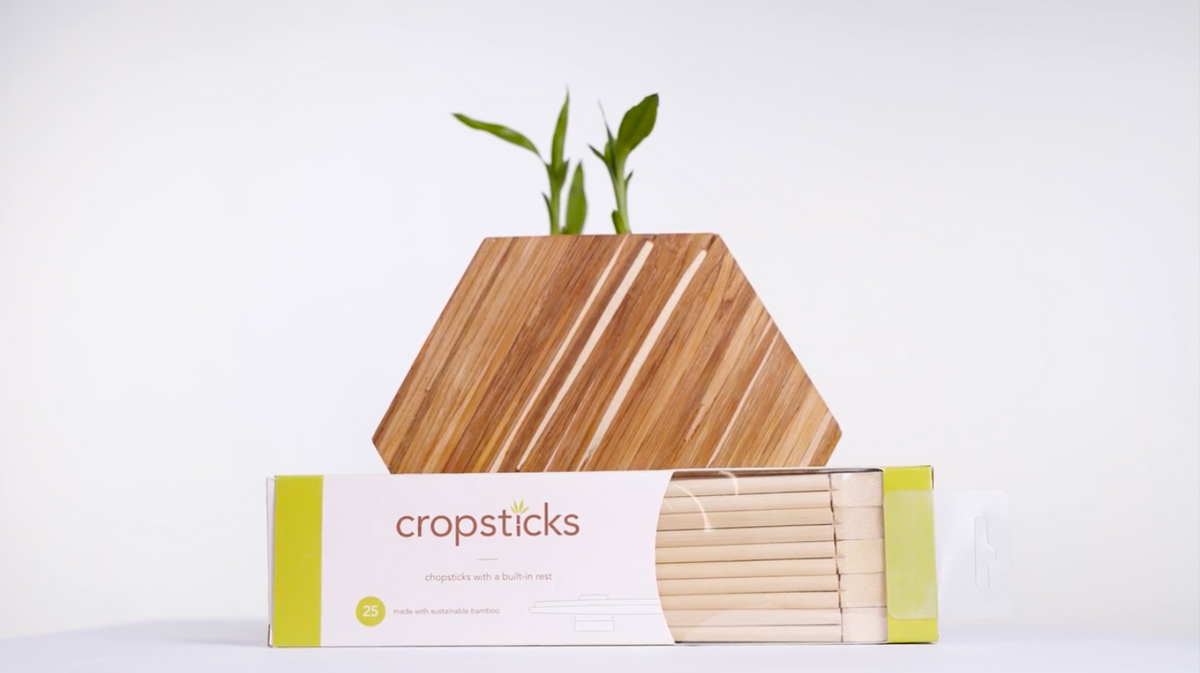As Seen on Shark Tank! Now in over 500+ restaurants, hotels, and retailers.
At Cropsticks® by Cropmade®, we focus on producing eco-friendly products for restaurants and retailers. As a new company, we precisely evaluate each step we take. By carefully selecting materials that are helpful for the environment to upcycling used products, we are committed to full-circle sustainability.
Did you know that bamboo is the fastest-growing plant on earth and is part of the grass family? Cropsticks® are made from bamboo. Currently, 45% of one time use chopsticks are still made from trees — that’s around 36 billion chopsticks contributing to deforestation and increased carbon emissions.
Chop a tree down, and it's gone forever. Chop down bamboo, and it grows right back.
We “meet the highest standards of verified social and environmental performance, public transparency, and legal accountability to balance profit and purpose.”
With Cropsticks®, you now have a built-in rest, also known as a hashioki in Japanese. A hashioki is a traditional piece of Japanese tableware used to keep chopsticks off surfaces and to prevent them from rolling off the table.
To maintain sustainability at a full circle, restaurants have the option, where available, to upcycle their used Cropsticks® into beautiful tiles made for shelving, flooring, tabletops, and more. These products can be found through our partners ChopValue, a homeware and decor company whose mission is to “make a difference, one chopstick at a time.”
In July of 2019, we announced the release of our Bamboo Straws. By intentionally choosing to make our bamboo straws out of bamboo fiber, we are reducing the amount of harmful plastic straw alternatives on the market. These straws can withstand liquids for hours, and our range of sizes make them a perfect choice for any beverage.
Certifications/Approvals:
○ FDA, SGS, Intertek, JFRL, BPI
Each pair of Cropsticks® is packaged in a sleeve made of recycled paper.
In addition to the actual Cropsticks® themselves, we wanted to ensure that our packaging did not require the use of any new trees. Cropsticks® are manufactured in China and shipped to California. To mitigate the impact of cross-oceanic shipping, we are currently exploring ways to offset the carbon footprint created by our transportation of Cropsticks®.
We have partnered with suppliers that meet ISO 9000 standards to uphold our vision of sustainability.
ISO 9000 is a series of international voluntary standards and guidelines around environmental management systems, eco labeling, environmental auditing, environmental performance evaluation, environmental aspects in product standards, and life cycle assessments.
To mitigate the quantity of Cropsticks® that go to landfill as much as possible, we have partnered with ChopValue, the world's first ever chopstick recycling company, to pilot a program that would give used Cropsticks® a new life.
Through this partnership, used Cropsticks® are turned into a new bamboo products, including coasters and home decor. Chop-value handles the collection and manufacturing of used Cropsticks®.
To date, we set a goal of collecting back 400 pounds of used Cropsticks®. By the end of the year, we found great enthusiasm for our program and surpassed our goals. We have collected back 596 pounds of Cropsticks®, which is approximately 63,574 chopsticks saved from landfill.
*In March 2020, we paused this upcycle program. We look forward to continuing this program once logistics and safety measures are in place."
